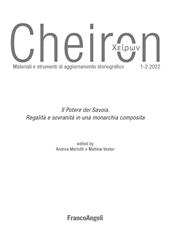Il potere di grazia nel Regno di Sardegna durante la Restaurazione
169-184 p.
L'istituto della grazia "si evolve in funzione delle necessità dell'ordinamento e si presta così all'abolizione in via di fatto della pena di morte, alla valutazione di circostanze non previste dal legislatore, ripara errori giudiziari, si fa strumento di modulazione della pena" (Stronati, 2009). Nelle monarchie assolute ciò trovava giustificazione nella concentrazione di tutti i poteri nelle mani del sovrano, unico soggetto in grado di condizionare le decisioni del potere giudiziario. Nella forma di governo parlamentare il potere di grazia è sopravvissuto come atto di prerogativa regia, conferito in via esclusiva al monarca. L'art. 8 dello Statuto Albertino riconosceva infatti al Sovrano il potere di fare la grazia e commutare le pene.
In una prima fase si riteneva che il pote-re in esame fosse esclusivamente nelle mani del monarca, tuttavia, venne presto coinvolto anche il ministro Guardasigilli. Questi era chiamato, infatti, a controfirmare il decreto, di cui si assumeva la responsabilità. Partendo da un'analisi necessariamente giuspubblicistica, il saggio esamina tale istituto soffermandosi in particolare sulla ricaduta del potere di grazia sul sistema penale dell'Ottocento. [Testo dell'editore].
The institute of grace "evolves according to the needs of the legal sys-tem, introduces substantially the abolition of the death penalty, inserts circumstances not foreseen by the legislator, repairs judicial errors, becomes an instrument for modulating the condemnations" (Stronati, 2009). In the absolute monarchies, the act of grace was justified by the concentration of all powers in the hands of the Sovereign, the only person capable of influencing the decisions of the judiciary power. In the parliamentary government, the power of pardon survived as a royal prerogative, conferred exclusively to the Monarch. Art. 8 of the Albertine Statute in fact recognized the Sovereign the power to grant pardons and to commute condemnations. In a first phase, it was believed that the power in question was exclusively in the hands of the Monarch, however the Minister of Justice was soon involved as well.
In fact, he had to countersign the decree of grace, for which he assumed responsibility. Starting from a public law analysis, the essay aims to examine this institute of grace, focusing in particular on the impact of this power on the penal system of the Nineteenth century. [Publisher's text].
-
Articles from the same issue (available individually)
-
Information
ISSN: 1127-8951
DISCIPLINES
KEYWORDS
- Savoia, diritto penale, grazia
- Savoy, criminal law, grace


